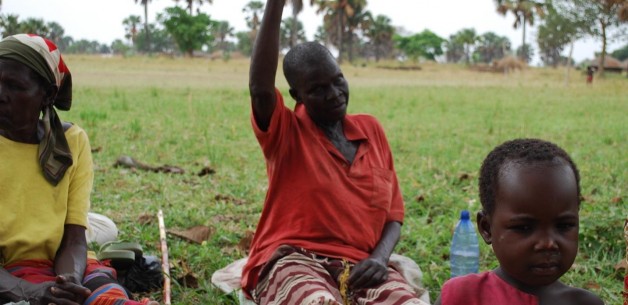Image: A visually impaired respondent raises concerns during FGD at pawel parish in Patiko Sub County, Gulu district, Uganda
The Disability and World Bank Safeguards Campaign, a partnership between the Bank Information Center and the Lebanese Physical Handicapped Union, submitted revised World Bank Environmental Assessment Policy (OP 4.01), Indigenous Peoples Policy (OP 4.10), and Involuntary Resettlement Policy (OP 4.12) that have been revised to include disability to the World Bank Safeguard Team. The Campaign does not endorse the policies as they currently stand or the revised policies in their entirety; rather, this submission serves to demonstrate how aspects of these policies are weak and must be improved by including persons with disabilities. This is a direct response to the question the Campaign and other disability advocates have been asked by World Bank management, “How does the World Bank integrate disability into the safeguards?”
Disability is a cross-cutting issue inextricably linked with poverty; therefore, disability must be mainstreamed across all relevant policies currently under review. The language changes in OPs 4.01, 4.10, and 4.12 highlight ways in which the World Bank can be inclusive to persons with disabilities and other groups more vulnerable to poverty; the new language also underscores triggers for when inclusive language regarding persons with disabilities should be included in the policies. This language is modeled after the United Nations Convention on the Rights of Persons with Disabilities, the international standard on the rights of persons with disabilities, and has been informed by case studies on how persons with disabilities have been impacted by World Bank projects, including the National Inclusion Project in Lebanon, the Conditional Cash Transfer Program in the Philippines, and the Northern Uganda Social Action Fund II in Uganda.
Persons with disabilities face many barriers to being included in mainstream society, and the inclusion of language in the safeguard policies specifically targeting the unique needs and impacts of World Bank projects and programs on persons with disabilities will enable persons with disabilities to participate in, benefit from, and not be harmed by World Bank projects and programs. Moreover, persons with disabilities will be meaningfully consulted about projects and programs that might affect them. Ultimately, the inclusion of language regarding persons with disabilities will ensure persons with disabilities are not further harmed or left out of poverty reduction projects and will help the World Bank to achieve its mission.
World Bank Environmental Assessment Policy (OP 4.01): It should be noted that this submission is not in conflict with the Bank Information Center’s previous submission of its Environmental and Social Assessment and Management Policy (ESAM). The Campaign supports the ESAM; the Environmental Assessment Policy attached here highlights areas in which persons with disabilities will be uniquely impacted by an Environmental Assessment and offers language to mitigate harm and address the needs of persons with disabilities.
Indigenous Peoples Policy (OP 4.10): It is important to highlight that current language used in the Indigenous Peoples Policy, and reflected in this submission given its goal, is in conflict with international standards on indigenous peoples’ rights. The World Bank must align its safeguards policies with international law and standards, including the United Nations Declaration on the Rights of Indigenous Peoples. The primary tenants in this revised policy from the disability perspective are those of accessibility, inclusion, and participation, and the Campaign fully supports the rights of indigenous peoples, including indigenous peoples with disabilities, to self-determination.
Involuntary Resettlement Policy (OP 4.12): This policy is the most personal or individual affecting policy. Where other policies are more community or group based, the Involuntary Resettlement Policy impacts individual person’s lives as well as the community in which these persons live and participate in the social norms of life. For this reason, language has been incorporated into the revised policy to get at the heart of the issue of inclusion into the community or society as a whole through personal living enhancements. The addition of a methodology for Resettlement Plan Accessibility and Inclusion Standards is an example of how to help ensure meaningful accessibility and inclusion take place. The underlying objective is to further persons with disabilities mainstreaming into society while facilitating both short and long-term economic benefits to the communities by enabling persons with disabilities the ability to experience the human pride and dignity of full participation with fellow community members. Again, the revisions are to stimulate thinking of how persons with disabilities can be incorporated and are not meant to be absolutes.

